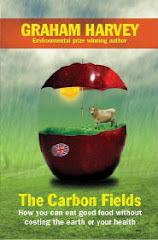
I talked about this topic last July in the Comment is Free website - Reaping what we've sown. Here is an extract from the article.
"It would be comforting to think that, in the brave new world of microprocessors and nano-technology, food production would be less vulnerable to such natural disasters. Unfortunately, the reverse is the case. If the recent floods and rainstorms prove anything, it's that at the start of the 21st century our food supplies remain worryingly insecure and precarious.
As far as the countryside is concerned the main accomplishment of the European Union - and its poisonous offspring, the common agricultural policy (CAP) - has been to increase massively the grain-growing area at the expense of grassland. Since we joined the EU in the early 1970s, Britain's wheat-growing area has doubled. Instead of grazing livestock on pasture, many cattle farmers concentrated their animals in sheds and fed them on the cheap, subsidised grain.
Compared with traditional pastoral farming systems, wheat-growing is highly unstable. It relies on energy-rich inputs of chemical fertilisers and sprays, many of them imported. It demands a decent spell of weather at harvest time if the crop is to be got in. And, even under favourable conditions, it depends on squadrons of diesel-burning monster machines to do the job."


1 comment:
Dear Graham,
interesting discussion in the Archers (I am a Dutch fan!) You might have already heard this, but today I saw this report on biofuels mentioned:
Once more: biofuels from crops can increase CO2 emissions
In a new study Tim Searchinger of the German Marshall Fund confirmes that converting forest and grassland to produce crops for biofuels produces unforeseen greenhouse gas emissions. Thus it increases their cost, raising concerns about large biofuel mandates.
Most prior studies have found that substituting biofuels for gasoline will reduce greenhouse gasses because biofuels sequester carbon through the growth of the feedstock. These analyses have failed to count the carbon emissions that occur as farmers worldwide respond to higher prices and convert forest and grassland to new cropland to replace the grain (or cropland) diverted to biofuels. Using a worldwide agricultural model to estimate emissions from land use change, we found that corn-based ethanol, instead of producing a 20% savings, nearly doubles greenhouse emissions over 30 years and increases greenhouse gasses for 167 years. Biofuels from switchgrass, if grown on U.S. corn lands, increase emissions by 50%. This result raises concerns about large biofuel mandates and highlights the value of using waste products.
Another recent study shows that soybeans are meant to have a similar effect to corn ethanol, Searchinger reveals. Thus he author suggests a shift towards greater use of soybeans.
The article concludes by endorsing the particular value of making biofuels from municipal, industrial or agricultural waste products.
German Marshall Fund: Use of US Croplands for Biofuels Increases Greenhouse Gases Through Emissions from Land Use Change
Source: www.iNSnet.org
Kind regards, Hugo
Post a Comment